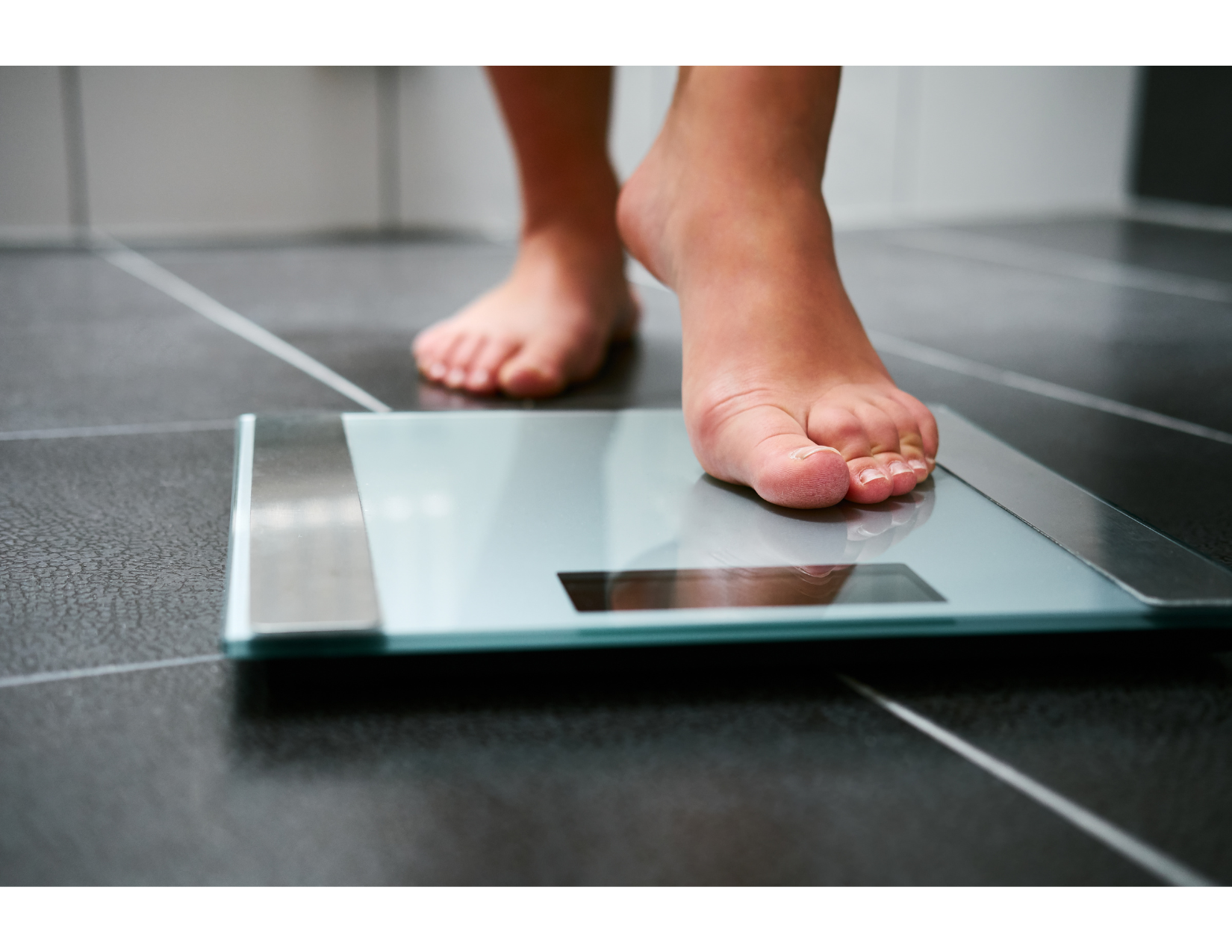
Make Sense of the Scale: Understanding Its Limitations and Embracing a Holistic Approach to Fitness

Picture this: It's early Monday morning.
The house is quiet, and the first rays of sunlight are just peeking through your curtains.
You've been diligently following your new fitness routine for weeks now, watching what you eat, hitting the gym regularly, and even passing up those tempting office donuts.
With a mix of excitement and trepidation, you step onto that familiar square device in your bathroom – the scale.
But as you look down at the numbers, your heart sinks.
The reading hasn't budged since last week, or worse, it's gone up! Suddenly, all that hard work feels pointless. You're tempted to throw in the towel and head straight for the nearest drive-thru for a consolation breakfast.
Sound familiar? If so, you're not alone. In our quest for better health and fitness, many of us have developed a love-hate relationship with the bathroom scale. It's often the first thing we turn to for validation of our efforts, the arbiter of our success or failure. We've given this simple device an enormous amount of power over our moods, our motivation, and our self-esteem.
But here's the thing: while the scale can indeed provide useful data, it's just one small piece of a much larger puzzle.
In this article, we're going to pull back the curtain on the mysterious world of weight fluctuations.
We'll explore why the number on the scale can be fickle, particularly when it comes to water retention. You'll discover why that plate of sushi you enjoyed last night might have you weighing in heavier this morning, even though you haven't gained an ounce of fat.
But we won't stop there.
We'll also introduce you to a more comprehensive, holistic approach to tracking your fitness progress. You'll learn about the numerous other indicators of health and fitness that don't involve standing on a scale – indicators that often paint a much more accurate and motivating picture of your journey.
Whether you're just starting your fitness journey or you're a seasoned gym-goer, understanding these concepts can be a game-changer. It can free you from the emotional rollercoaster of daily weigh-ins and help you celebrate the real, meaningful progress you're making.
So, are you ready to change your relationship with the scale and discover a more balanced, enjoyable approach to fitness? Let's dive in and start making sense of the scale!
The Deceptive Nature of Daily Weigh-Ins

Picture this: You've been diligently following your nutrition plan and exercise routine for a week. Excited to see your progress, you step on the scale, only to find that you've gained a pound.
Disappointment sets in, and you're tempted to throw in the towel. Sound familiar?
Is it weight fluctuations or weight gain?
This scenario plays out countless times in homes across the world. However, what many people fail to realize is that the number on the scale can be highly deceptive, especially when viewed in isolation or on a day-to-day basis.
Understanding Water Weight Fluctuations
One of the most significant factors influencing short-term weight fluctuations is water.
Your body's water content can fluctuate dramatically from day to day, and these fluctuations can account for a substantial portion of your total body weight.
The Surprising Magnitude of Water Weight Fluctuations

Picture this: It's Monday morning. You step on the scale, feeling great about your weekend filled with healthy meals and a couple of solid workouts. The number you see makes you smile – you're down 2 pounds from last week!
Fast forward to Tuesday morning. You've stuck to your plan, eaten well, and even squeezed in another workout. Confident, you step on the scale, only to see... you're up 3 pounds from yesterday?! Your heart sinks. What went wrong?
The answer? Probably nothing. Welcome to the world of water weight fluctuations.
Experts estimate that water weight can cause your body weight to fluctuate by 2-4% on any given day. Let's break that down with some real-world numbers:
If you weigh 150 pounds, a 2-4% fluctuation means your weight could vary between 144 and 156 pounds.
At 200 pounds, you could see anywhere from 192 to 208 pounds on the scale.
Even at a lean 130 pounds, you might weigh in between 125 and 135 pounds.
And remember, we're talking about changes that can happen overnight or even within the same day – all without gaining or losing an ounce of body fat!
Here's the kicker: many of us let these numbers dictate our mood and motivation.
You might feel on top of the world seeing you're down a few pounds on the scale, only to feel defeated and ready to throw in the towel when it reads up a few pounds the next day. But in reality, your body composition hasn't changed at all.
It's like judging the success of your cross-country road trip based on your car's fuel gauge at random points along the way. Sometimes you'll be full up, sometimes nearly empty, but neither tells the whole story of your journey.
So the next time you see an unexpected jump on the scale, take a deep breath. Remind yourself that your body is a complex, ever-changing system, not a simple number.
That "gain" might just be extra water from last night's salty dinner, or your muscles holding onto extra fluid as they repair and grow stronger from your latest workout.
By understanding these fluctuations, you can free yourself from the emotional rollercoaster of daily weigh-ins and focus on the bigger picture of your health and fitness journey.
After all, isn't feeling energized, strong, and confident worth more than any number on a scale?
Factors Influencing Water Retention: The Hidden Culprits Behind Scale Surprises
Ever stepped on the scale the morning after a sushi dinner and wondered why you've suddenly "gained" two pounds overnight? Or noticed your weight creep up during a particularly stressful week at work?
The culprit is likely water retention, and there are several sneaky factors that can cause your body to hold onto extra water. Let's dive into these hidden scale-tippers:
Sodium Intake: The Salty Saboteur Remember that bag of pretzels you munched on during movie night? High-sodium foods can cause your body to hold onto water like a camel preparing for a desert trek. This doesn't mean you've gained fat, but it can lead to a temporary increase on the scale. Next time you indulge in a salty treat, don't be surprised if your weight is up a pound or two the next day – it's just your body's way of maintaining balance.
Carbohydrate Consumption: The Pasta Effect Carbs aren't the enemy, but they can play tricks on the scale. When you eat carbohydrates, your body stores them in your muscles and liver as glycogen – and each gram of glycogen holds onto about 3 grams of water. So that delicious pasta dinner might cause a slight uptick on the scale the next day. But don't worry, it's not fat gain, and it's temporary. As you use that stored energy, the water will be released.
Hydration Levels: The Counterintuitive Culprit Here's a paradox for you: not drinking enough water can actually make you retain more water. When you're dehydrated, your body goes into conservation mode, holding onto every drop it can. This can lead to a slight weight fluctuation in the form of weight gain on the scale. The solution? Stay consistently hydrated. Your body will trust that more water is coming and won't feel the need to hoard it.
Menstrual Cycle: The Monthly Fluctuation Ladies, if you've ever felt bloated and heavier during certain times of the month, you're not imagining things. Many women retain water during the luteal phase of their menstrual cycle (the week or so before their period). This can cause a weight increase of up to 5 pounds, which disappears once your period starts. Understanding this cycle can help you avoid unnecessary frustration with the scale.
Exercise: The Muscle Repair Paradox Just crushed an intense workout and feeling great, only to step on the scale the next day and see a higher number? Don't panic! When you exercise, especially if you're doing strength training or high-intensity workouts, your muscles develop micro-tears. As part of the repair process, your body sends extra water and blood to these areas, causing a temporary increase in weight. This is a good thing – it means you're getting stronger!
Alcohol Consumption: The Dehydration Double-Whammy That Friday night cocktail might have more impact on the scale than you realize. Alcohol is a diuretic, meaning it makes you lose water (hello, frequent bathroom trips!). In response, your body might start retaining water to compensate for this loss. Plus, the dehydration can make you feel hungrier, potentially leading to overeating. So if you see a spike on the scale after a night out, remember – it's likely just water weight that will resolve in a day or two with proper hydration.
Certain Medications: The Prescription Puzzle Some medications, particularly those for high blood pressure, diabetes, or depression, can cause water retention as a side effect. If you've recently started a new medication and noticed unexplained weight gain, this could be the reason. Always consult with your doctor about potential side effects and whether they're cause for concern.
Stress: The Sneaky Scale-Tipper Ever noticed the scale creep up during a particularly hectic week at work or while planning a big event? You're not imagining things – stress can indeed cause water retention. When you're stressed, your body releases the hormone cortisol, which can influence your body's water balance and lead to water retention. It's like your body is trying to hold onto resources to weather the storm. Plus, stress can disrupt your sleep patterns and eating habits, further contributing to water retention. So the next time you're facing a stressful situation and see a slight increase on the scale, take a deep breath. It's likely just temporary water weight, not fat gain. Focus on stress-reduction techniques like meditation, yoga, or even a simple walk in nature. As your stress levels decrease, you might just see that extra water weight flush away.
Understanding these factors, including the role of stress, can help you make sense of those mysterious fluctuations on the scale. Remember, a pound of water weighs the same as a pound of fat on the scale, but they're very different in terms of your health and body composition. By recognizing these influences, you can avoid the emotional rollercoaster of daily weigh-ins and focus on long-term trends and how you feel overall.
The Pitfalls of Daily Weigh-Ins
We've all been there – stepping on the scale every morning, holding our breath, and letting a simple number determine the course of our day.
But given the fluctuations we've discussed, this daily ritual can be more harmful than helpful.
Let's break down why your scale shouldn't be your daily judge, jury, and executioner:
The Emotional Rollercoaster: From Cloud Nine to Rock Bottom in 0.2 Pounds Picture this: On Monday, you step on the scale and you're down two pounds. You feel invincible! You strut into work, turn down those tempting donuts, and hit the gym with gusto. But come Tuesday, the scale shows a one-pound increase. Suddenly, your mood plummets. You feel like a failure, question every life choice, and eye that pint of ice cream in the freezer. Sound familiar? This emotional whiplash isn't just exhausting – it's counterproductive. Your weight naturally fluctuates day to day, and letting these normal changes dictate your emotions can lead to stress, anxiety, and even disordered eating patterns.
Misinterpretation of Progress: When Good News Looks Bad on the Scale Imagine you've been hitting the gym hard, focusing on strength training. You're feeling stronger, your clothes fit better, and you're full of energy. But the scale? It hasn't budged, or worse, it's gone up a pound or two. Frustrating, right? But here's the plot twist: you might be making incredible progress! Muscle is denser than fat, meaning as you build muscle and lose fat, your weight might stay the same or even increase slightly, even though your body composition is improving dramatically. Daily weigh-ins don't tell this nuanced story. They can't distinguish between muscle gain, water retention, and fat loss. Don't let the scale trick you into thinking you're not progressing when you're actually crushing it!
Obsessive Behavior: When the Scale Becomes Your Taskmaster It starts innocently enough – just a quick daily check-in on the scale. But before you know it, you're weighing yourself multiple times a day, agonizing over every tenth of a pound. You start avoiding social events that might lead to water retention or weight gain. You plan your entire day around your morning weigh-in. This obsessive focus on the scale can overshadow the true joys of a healthy lifestyle – feeling strong, having energy, enjoying delicious and nutritious foods, and living life to the fullest. Don't let the scale become the boss of you. There's so much more to health and fitness than a number!
Short-term Focus: Missing the Forest for the Trees When you weigh yourself daily, it's easy to get caught up in the micro-changes and lose sight of the bigger picture. Fitness journeys aren't linear. They involve ups and downs, plateaus and breakthroughs. By fixating on daily numbers, you might miss the amazing progress you're making over weeks and months. Maybe the scale hasn't moved much this week, but your energy levels are through the roof, you're sleeping better than ever, and you just had your best workout. These are the victories that truly matter in the long run!
Remember, the scale is just a tool, not the whole toolbox.
It can provide useful data when used correctly, but it shouldn't be the sole measure of your progress or worth.
Instead of getting caught up in daily numbers, try to focus on how you feel, how your clothes fit, your energy levels, and your overall health.
These are the true indicators of progress that no scale can measure. Your fitness journey is a marathon, not a sprint – so ditch the daily weigh-ins and enjoy the ride!
A Better Approach to Using the Scale

While the scale shouldn't be discarded entirely, it's essential to use it more effectively. Here are some strategies for a more balanced approach to dealing with weight fluctuations:
Weekly Averages: Instead of focusing on daily weights, you could calculate a weekly average. This smooths out daily fluctuations and provides a more accurate picture of your progress.
Consistent Weigh-In Conditions: If you choose to weigh yourself regularly, do so under consistent conditions. This typically means weighing yourself first thing in the morning, after using the bathroom, and before eating or drinking.
Track Trends, Not Daily Numbers: Utilize weight tracking apps or software to monitor your weight and minimize the emotional impact of weight fluctuations over time. These tools can help identify and filter out anomalies, revealing the true trajectory of your weight loss efforts. Look for apps that offer features like trend lines, moving averages, and data visualization to help you focus on long-term progress rather than daily fluctuations. Remember, it's the overall trend that matters, not individual data points.
Extended Timeframes: Too often, the comparison of body weight is just to yesterday or the most recent weigh-in and then that comparison is used as the catalyst for that day's mood - if the scale was down, happy, and if the scale was up, frustrated. Instead, embrace a longer timeline when looking at weight change. Compare your current weight to where you were a month ago, not just yesterday or last week. This can provide a more realistic view of your progress.
Consider Body Composition: Look beyond total weight by measuring body composition. Several non-invasive technologies can provide insights into your fat mass, muscle mass, and other key metrics. By tracking these metrics alongside weight, you can gain a more comprehensive understanding of your fitness progress and weight fluctuations by distinguishing between fat loss and muscle gain.
Beyond the Scale: Holistic Measures of Progress

While the scale can be a useful tool when used correctly, it's important to remember that it's just one measure of progress. Here are other indicators to consider:
Clothing Fit: Pay attention to how your favorite jeans feel or how your go-to shirt hangs on your shoulders. That once-tight waistband becoming looser or buttoning your shirt with ease can be incredibly satisfying and tangible signs of progress. These daily interactions with your wardrobe often provide more meaningful and motivating feedback than any number on a scale. Plus, the joy of fitting into an outfit you've been eyeing or rediscovering old favorites in your closet can boost your confidence and reinforce your commitment to your fitness journey..
Energy Levels: Notice how you feel when you wake up in the morning. Are you hitting the snooze button less? Do you find yourself naturally waking up before your alarm? Pay attention to that mid-afternoon slump – is it disappearing? Maybe you're no longer reaching for that extra cup of coffee to get through the day. Perhaps you're finding the energy to play with your kids after work or take your dog for an extra walk. These daily boosts in vitality are powerful indicators of improved health and fitness that no scale can measure. Embrace that newfound spring in your step – it's a sign your body is thriving with your healthier lifestyle.
Strength and Performance: Remember when you struggled to carry your groceries? Now you're breezing through it! Or perhaps you've noticed that you're no longer out of breath after climbing a flight of stairs. Maybe you've surprised how easily you can keep up the your kids or grandkids. These real-world improvements in strength and endurance are the true victories of your fitness journey. They're not just numbers in your workout log – they're tangible proofs of your body becoming more capable, more resilient. Celebrate these milestones! These achievements reflect your growing physical abilities in ways that go far beyond what any scale could tell you..
Sleep Quality: Have you noticed you're tossing and turning less at night? Maybe you're no longer waking up in the middle of the night or struggling to fall asleep. Perhaps you've realized you don't need to hit that snooze button multiple times anymore. These improvements in your sleep patterns are silent victories in your fitness journey. Pay attention to how you feel when you wake up – that refreshed, ready-to-tackle-the-day feeling is a powerful indicator of better sleep quality. You might even find yourself naturally waking up before your alarm, your body finding its natural rhythm. This enhanced sleep isn't just about feeling good in the morning; it's fueling your daytime energy, supporting your workouts, and contributing to your overall well-being in ways that far outweigh any number on a scale.
Mood and Mental Clarity: Remember those days when brain fog seemed to be your constant companion? Now, you might find yourself tackling complex tasks at work with newfound ease or remembering where you left your keys without a frantic search. Perhaps you've noticed you're laughing more, finding joy in small moments, or handling stress with a calm you didn't have before. Maybe your family has commented on your upbeat attitude or how you seem more patient these days. These shifts in your mental state are profound indicators of your improving health. That clarity of thought, emotional resilience, and overall sense of well-being are the invisible yet invaluable rewards of your fitness journey. They reflect changes happening not just in your body, but in your brain chemistry and emotional balance – transformations that no scale could ever capture, but that enhance every aspect of your daily life.
The Role of Professional Guidance
Navigating the complexities of fitness tracking and progress measurement can be challenging. This is where professional guidance can be invaluable. A qualified personal trainer or fitness coach can:
Help you understand and interpret your weight data in the context of your overall progress.
Provide personalized strategies for tracking progress that align with your specific goals.
Offer education on nutrition, hydration, and other factors that influence weight fluctuations.
Provide motivation and accountability to keep you focused on long-term progress rather than short-term fluctuations.
Conclusion: Embracing a Balanced Perspective and Finding Support
The journey to improved health and fitness is a complex and multifaceted adventure, one that goes far beyond the numbers on a scale. While weight can provide valuable data, it's crucial to understand its limitations and place it in the proper context. By adopting a more holistic approach to tracking progress, you can avoid the emotional rollercoaster of daily weigh-ins and gain a more accurate, motivating picture of your fitness journey.
As we've explored, there are numerous factors to consider:
Water weight fluctuations can significantly impact day-to-day scale readings, often masking true progress.
Various elements, including sodium intake, carbohydrate consumption, and hormonal changes, can influence water retention and weight.
Long-term trends provide a much more accurate representation of progress than daily fluctuations.
Multiple measures of progress – from how your clothes fit to your energy levels and mood – offer a more comprehensive view of your health and fitness.
Professional guidance can be invaluable in interpreting your data and creating a personalized, effective fitness plan.
By embracing this balanced perspective, you can maintain motivation, celebrate your true progress, and enjoy a healthier relationship with both the scale and your overall fitness journey. Remember, true fitness is about overall health, well-being, and sustainable lifestyle changes that enhance every aspect of your life.
However, we understand that navigating this complex landscape of fitness and weight management can be challenging. That's where we at Evolved Personal Training come in. We're not just here to guide you through workouts – we're here to help you understand and navigate your weight in the context of your overall health and fitness goals.
We're Here to Help
At Evolved Personal Training, we recognize that every individual's fitness journey is unique. Our experienced trainers are equipped to help you:
Interpret the numbers on the scale in conjunction with other progress indicators
Develop a personalized effective, easy to implement, and enjoyable fitness plan that goes beyond weight loss
Understand how factors like nutrition, sleep, and stress impact your weight and overall health
Set realistic, achievable goals that focus on holistic health improvements
Celebrate non-scale victories and build lasting confidence in your body's capabilities
We're committed to providing you with the knowledge, tools, and support you need to make sense of your progress and achieve lasting, meaningful results. Whether you're just starting your fitness journey or looking to break through a plateau, we're here to guide you every step of the way.
Don't let the scale dictate your self-worth or hinder your progress.
Reach Out
If you're feeling overwhelmed by weight fluctuations or unsure how to measure your true progress, reach out to us at Evolved Personal Training.
Let's work together to create a fitness journey that's about more than just a number – one that celebrates your strength, enhances your well-being, and evolves you into the healthiest, happiest version of yourself.
Remember, your fitness journey is about evolution, not just change.
And at Evolved Personal Training, we're here to help you evolve in ways that no scale could ever measure. Take the first step towards a more balanced, informed approach to fitness – contact us today and let's start your path to leaner, healthier, and happier.
